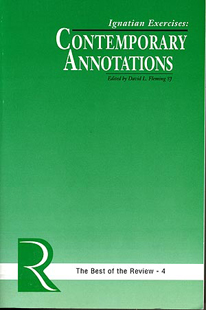
Price: £9.00
ISBN: 0 924768 06 1
|
THE
WAY a review of Christian spirituality |
| April 2013 | Vol 52 No 2 |
To readers and friends of The Way, welcome to our new issue:
To order this new issue of The Way only, please click HERE.
Please click here to subscribe to The Way.
Contents
Ignatius, Gratitude, and Positive Psychology: Does Ignatian gratitude develop Subjective Well-Being?
The question of whether the practice of spirituality has any measurable effects in the life of the practitioner is a fascinating one. Tom Carson addresses it by focusing upon gratitude as a key attitude promoted within Ignatian spirituality. Can this attitude be shown experimentally to have a positive effect on psychological well-being?
Download this article in PDF format by clicking here
The Marian Antiphon of Francis Bernardone: A Reflection upon the Relationship of the Virgin Mary with her Son in The Office of the Passion of St Francis
In his Office of the Passion, St Francis of Assisi rearranged quotations from the scriptures to form fifteen ‘new’ psalms. Although he puts these words into the mouth of Jesus, much is revealed in them about Francis himself. Here Ruth Evans considers what this Office tells us about the relationship between Francis and the Virgin Mary.
Discovering Joy: Four Thought Experiments for the Fourth Week
The final main section of the Spiritual Exercises, the ‘Fourth Week’, deals with the resurrection of Christ. Rob Marsh believes that it is often given short shrift, both in theory and by directors in practice. He here proposes four ‘thought experiments’ that might help us to understand and appreciate this part of Ignatius’ programme more fully.
The Mystical Theology of Karl Rahner
The twentieth-century theologian Karl Rahner believed that in the future Christians would be mystics, or they would be nothing. He also acknowledged that it was difficult to arrive at an agreed definition of mysticism. Harvey Egan here examines Rahner’s mystical theology, asking what this can tell us about a ‘mysticism of everyday life’.
MAGIS: The Search for More
For almost a decade now Jesuits have been running youth programmes under the heading Magis, a term used in Ignatian spirituality to mean ‘more’ or ‘greater’. At the heart of these programmes is the process of discernment, acquiring the tools to be able to recognise more clearly where God is leading the life of the one who discerns. Ludger Joos describes the experience of such programmes.
Metanoia and transformation II: Fourteen Points
In this second part of his essay (begun in the January 2013 issue), Norman Todd adapts the ‘fourteen points for management’ described by W. Edwards Deming to the transformation of the contemporary church. He argues that such transformation is constantly necessary, and the attempt to implement it can itself be a powerful promoter of Christian joy.
‘A Raid on the Inarticulate’: Eliot’s Four Quartets and the Christian Journey.
The Four Quartets of T. S. Eliot are complex poetry, allowing for multiple readings and interpretations. Here Keith Ravenscroft offers a theological approach to them, and in doing so discovers ‘a work of profound Christian witness’. They stand as a monument to the poet’s attempt to find and articulate the meaning of his own life, as well as that of his contemporaries.
Praise: The Fundamental Attitude in the Church
Towards the end of the Spiritual Exercises Ignatius included a series of guidelines for ‘thinking within the Church’. Many of these are framed in terms of aspects of church life and practice that are to be regarded as praiseworthy. Antonio Guillén asks what this might have meant in the sixteenth century, and how far it might still be useful for us today.
To order this new issue of The Way, please click HERE.
THE WAY IGNATIAN BOOK SERVICE
New titles from the Institute of Jesuit Sources:
Ignatian Exercises: Contemporary Annotations, edited by David L. Fleming SJ
Robert Bellarmine SJ, On the Eternal Happiness of the Saints
Jeremy Clarke SJ, Catholic Shanghai: A Historical, Practical and Reflective Guide
You have received this e-mail because you have been in touch with us in the past. We will be sending out this kind of promotional e-mail at approximately quarterly intervals, but we are anxious not to send information to anyone who does not want to receive it. If you would prefer not to hear about new issues of The Way, or if you are receiving more than one copy of our message, please click here. Note that if you e-mail The Way again, you may need to unsubscribe again—our mailing list is maintained manually!